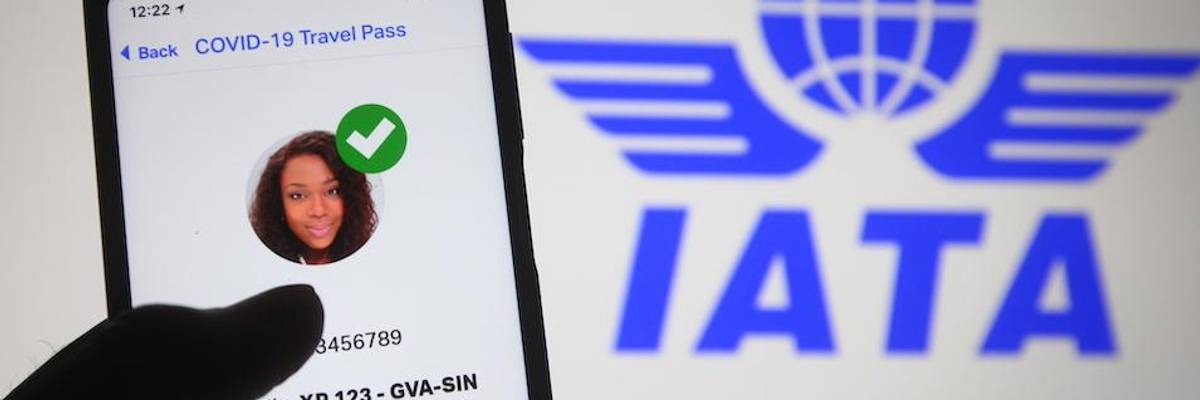Dr. Anthony Fauci, the Biden administration's chief medical adviser, said Monday that Covid-19 vaccine passports are "not going to be mandated from the federal government."
"I doubt that the federal government will be the main mover of a vaccine passport concept," Fauci, who heads the National Institute of Allergy and Infectious Diseases, said in an interview on the "Politico Dispatch" podcast.
It could be a different story, however, with individual entities like theaters or educational institutions.
"You could foresee how an independent entity might say, 'Well, we can't be dealing with you unless we know you're vaccinated.' But it's not going to be mandated from the federal government," Fauci said.
The interview came amid a rising number of coronavirus cases in the U.S. for a third straight week and fears of a potential fourth surge.
That surge could be prevented, Fauci said, with continued progress on Americans getting inoculated and sustained public health measures to contain the virus. Fauci pointed to the need to "put your foot on the accelerator when it comes to vaccinations"--which he called "incredibly efficacious." But "we can't declare victory prematurely," he added, cautioning against the lifting of coronavirus restrictions just yet.
Fauci's comments came amid swirling criticism from the left and right over the idea of vaccine passports.
The effort, though, is already underway in some parts of the world, as France24 reported:
Some countries have already introduced such policies, with Iceland becoming the first European nation to issue vaccine certificates in late January. Greece on Tuesday unveiled a digital vaccination certificate for those who have received two doses of the vaccine. Among the countries that are currently issuing or asking for vaccine certificates are Cyprus, the Czech Republic, Denmark, Estonia, Hungary, Italy, Poland, Portugal, Slovakia, Spain, and Sweden.
Across the English Channel, Prime Minister Boris Johnson announced Monday his government would consider Covid-19 "status certificates" as a pathway out of the health crisis.
In the U.S., the concept of a vaccine passport isn't popular; just 44% of likely voters back the idea, according to a Rasmussen poll out last week. Bolstering such lackluster support are privacy concerns about vaccination documents. From PBS NewsHour:
[T]here are growing concerns about data privacy as documents verifying Covid-19 vaccination would exist and generally be accessed digitally. These digital health records would operate outside of the Health Insurance Portability and Accountability Act of 1996, or HIPAA, which protects people's private medical information from being disclosed byhealthcare providers, health plans, or businesses. And there are instances when HIPAA allows that information to be released, such as when it is in the public interest. More broadly, some people are concerned that their data could be used against them by law enforcement, accessed by hackers, or sold to third-party vendors if regulators fail to offer appropriate oversight.
Further concerns, according to The Lancet, are that vaccine "certificates" threaten to exacerbate vaccine inequality. An editorial this month explained:
From a societal standpoint, granting vaccine certificate bearers access to select activities, venues, or international travel would undoubtedly provide impetus to the reopening of some sectors of the economy, such as hospitality, non-essential retail, and tourism. But it also risks generating hierarchical societies in which vaccinated individuals have exclusive privileges that are denied to those who have not received the vaccine. In countries where vaccine rollout is advancing rapidly, this inequity might be resolved in few months, but elsewhere it could be protracted for longer periods. And at an international level, against the backdrop of the currently limited availability of Covid-19 vaccine doses and their inequitable global distribution, the deployment of vaccine certificates for travel will afford citizens of high-income countries greater freedom of movement than citizens of low-income and middle-income countries.
At a Monday press briefing, meanwhile, Centers for Disease Control and Prevention director Dr. Rochelle Walensky expressed concern the nation is "entering our fourth week of increased trends and cases." But the positive news, she said, is that an increasing number of Americans are being vaccinated against Covid-19.
"To date, more than 106 million people have received at least one dose, and more than 61.4 million, or 18.5%, are fully vaccinated," said Walensky.
She pointed to a February event at a bar in Illinois that's been linked to 46 Covid-19 cases as a reminder of "the continued need for layer prevention strategies," including mask-wearing and physical distancing.




